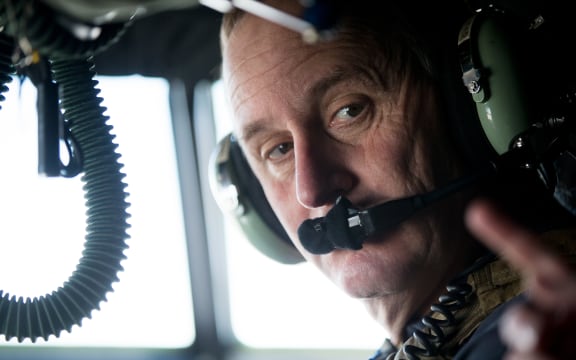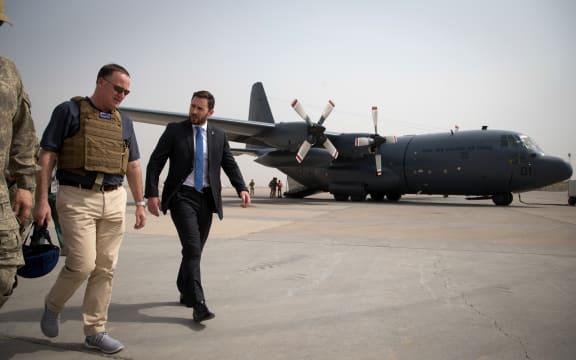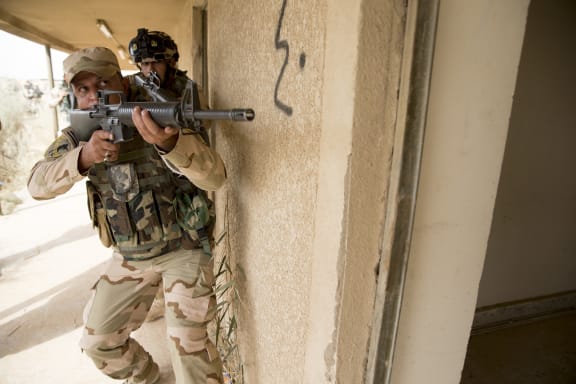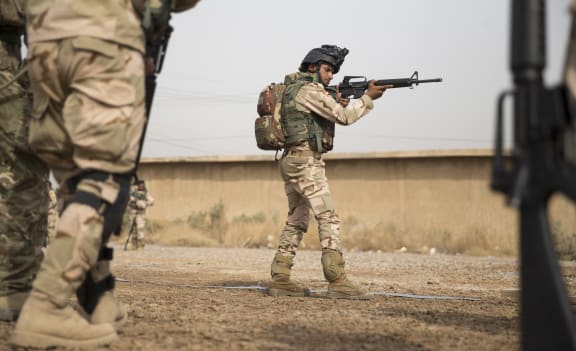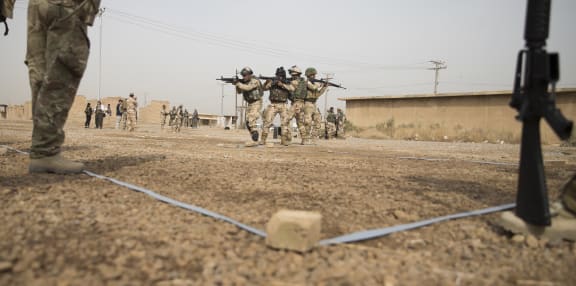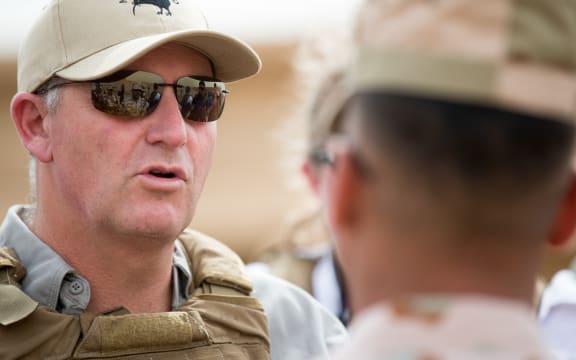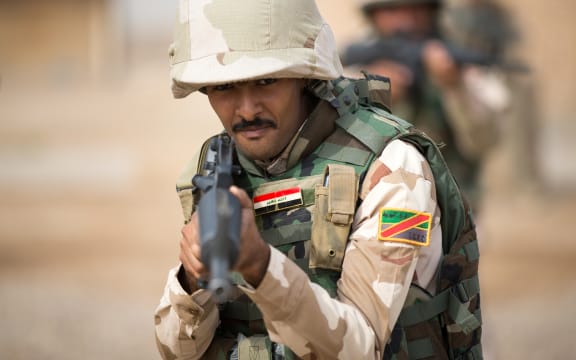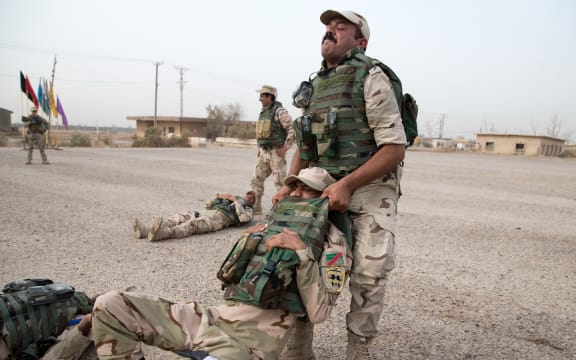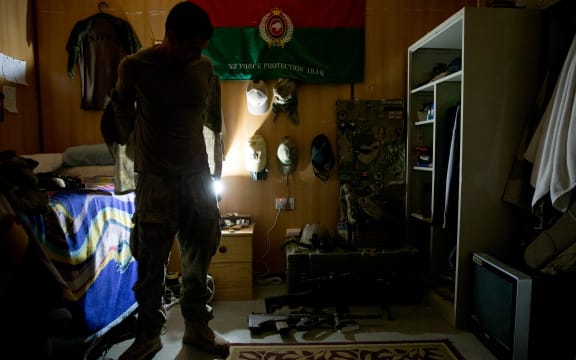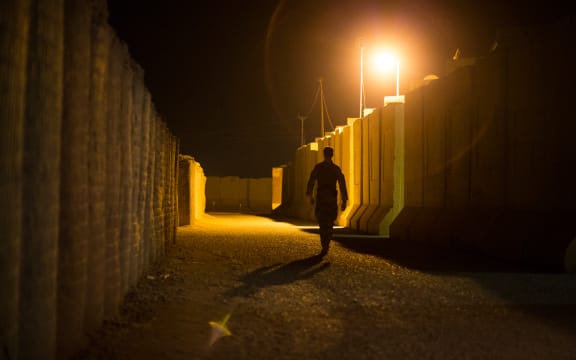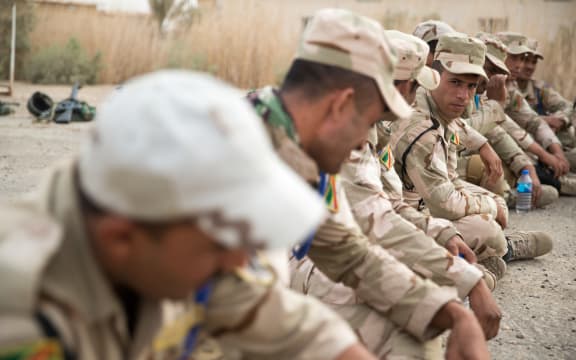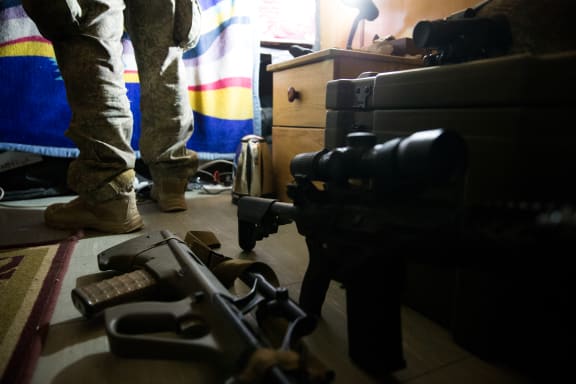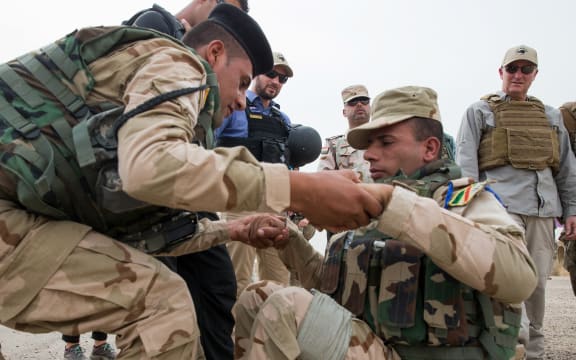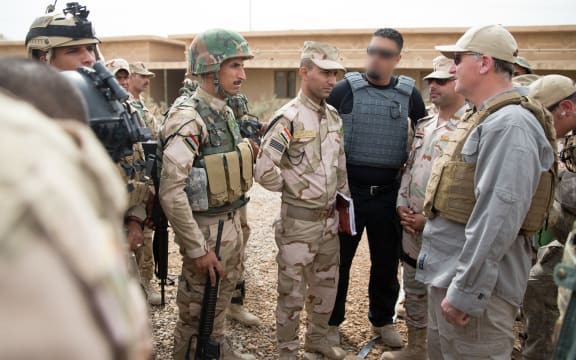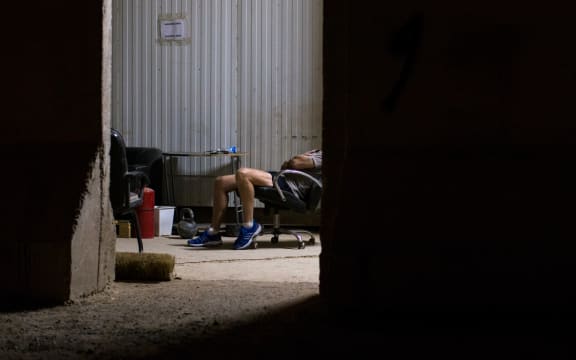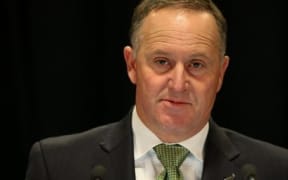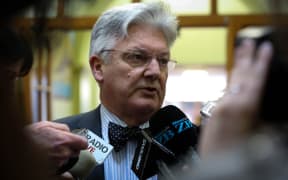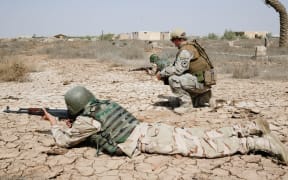Prime Minister John Key has described Taji Camp in Iraq as 'goddamm awful' and 'desolate' after visiting the New Zealand training mission there.
He flew out a few hours ago after a secret trip to the camp, which is 25 kilometres north-west of the capital Baghdad. A large group of SAS soldiers provided protection for Mr Key and the delegation.
The Prime Minister travelled to Iraq to meet the New Zealand troops and witness some of their training, which is designed to better equip the Iraqi security forces in their fight against Daesh, or Islamic State (IS), as part of a 62-country, United States-led coalition.
New Zealanders are part of a joint training programme with Australia; there are about 16 New Zealand trainers, along with logistics support and force protection provided by NZDF Regular Force soldiers. There are about 140 personnel, including command positions in Baghdad.
The three-day trip was shrouded in secrecy because of security concerns, and Radio New Zealand agreed to report the trip only once Mr Key had left the country. He is the first prime minister to visit troops in Taji Camp, which is surrounded by pockets of IS sympathisers and activity.
View a gallery of the PM's visit here
Mr Key observed several different types of drills led by New Zealanders on a training ground within the compound, including building clearances, combat first-aid and how to find and deal with improvised explosive devices (IEDs).
After a day observing the mission and meeting the soldiers, Mr Key was asked for his personal impressions.
"At one level I feel encouraged because they are in a massively safe location. I think the sort of compound within the compound provides a high degree of protection - you can see how seriously they take personal security. The force protection unit that's here to look after our trainers, the "guardian angels" for want of a better term, the ratio of them is quite heavy.
"But when you look at it, it's sort of a goddamn awful place isn't it - it's desolate, it's sort of beige. It's a tough operating environment, our people are out there working and when they start telling you it's 40 degrees and it's cool, what does hot look like? Well, the answer is 55 degrees and our people are out there working in that, so it's a tough place for them to operate in."
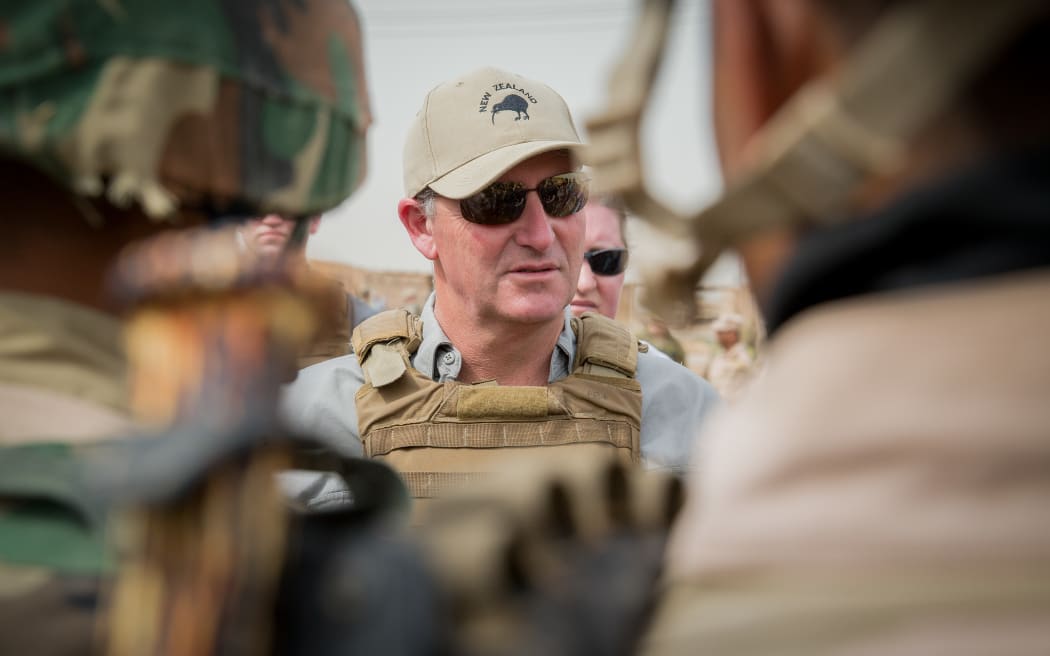
Photo: Pool Picture
The New Zealand deployment has been given a specific deadline of two years, and Mr Key said he had no intention to extend it out any further.
"I think we have come here to try and make a real difference, but to recognise, actually, we're a small country, we have a limited amount of resources. We've got people who've done a tremendous job over the last five or six months, they've had to build out the capability here, the physical infrastructure.
"You can see how harsh it is, I mean frankly, it's a bit of a rubbish tip down the road, in bits of it, and our people have had to work very hard to put together tremendous systems, actually - everything from logistics to the medical team.
"But we don't want to be here in Iraq forever. We were 10 years in Afghanistan, it's a big cost, it's a big commitment. These are men and women who are away from their families, and they'll do everything they can to do their job, but it's not my plan for them to be here long.
"I think New Zealand's got a job to do here, we're doing it and yeah, I think there should be an exit point and that exit point at two years feels about right to me."
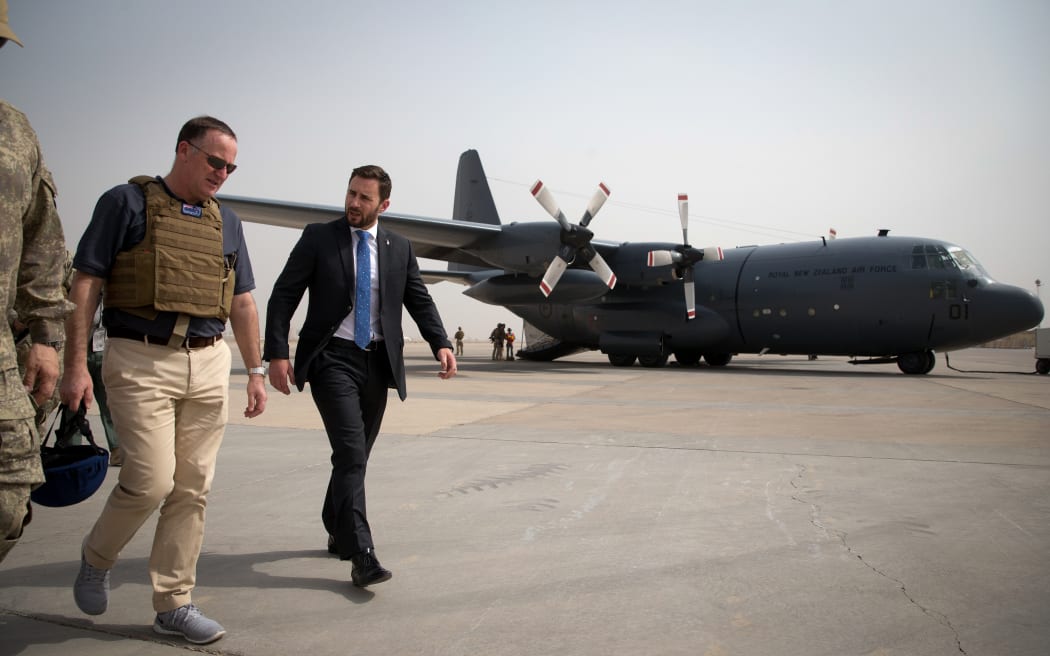
Photo: Pool Picture
When asked if two years was long enough, Defence Force chief Lieutenant-General Tim Keating said the length of the deployment was not up to him.
"Well, this is a politician decision and we're going to make a significant difference in two years' time. And any time we're here is making a difference and any battalion that we put through the training is making a difference. The political decision is two years and our people work very hard in that two years."
Fraught travel arrangements
Mr Key flew into Baghdad from an undisclosed location in the Middle East on Sunday, planning to spend the night at Taji Camp.
His visit was in danger of being cancelled however, after the planned flight into Taji that night was cancelled because of a sandstorm. Mr Key and a media contingent - accompanied by the SAS force protection team - got as far as Baghdad, but had to return to Dubai after the weather conditions made it too risky to carry on and fly into the camp.
The only transportation for New Zealand personnel and for visitors anywhere in Iraq is by air, because the risk of IEDs on the roads makes it too dangerous to drive.
Even the flight back to Dubai was fraught, with a couple of landing attempts abandoned due to heavy fog - the Air Force C-130 Hercules was eventually able to land at Dubai International Airport, and then had to stay there for the 14-hour crew stand-down.
On Monday night, alternative arrangements were made with the Australian Air Force to have the Prime Minister and the contingent flown in on a Hercules that was going to Taji Camp to pick up some Australian soldiers. Another coalition partner was called in to fly the contingent out on Tuesday, on American Chinooks, but due to another sandstorm, they had to turn back to Taji and the contingent eventually made it out that night on a New Zealand Hercules.
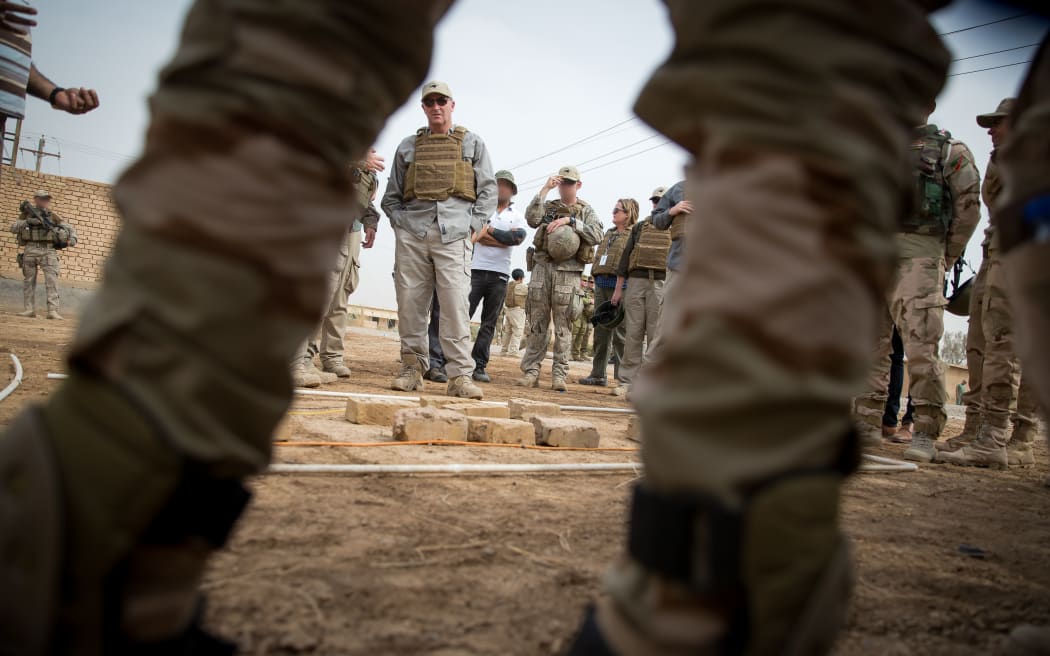
Photo: Pool Picture
Lieutenant-General Keating said the visit from the Prime Minister was very significant for the New Zealand troops in Iraq.
"This is ultimately a decision made by the politicians, made by the Prime Minister, so having that backing, the support, from our political leadership, to come to the front line to have a look at what the troops are doing, to experience some of what they're experiencing.
"I can brief him in his office, in his Cabinet room to the nth degree, but until you come and sort of smell the dust and describe the desolate landscape and the conditions our people are living under, I think this is very important for a political leader."
The first New Zealand soldiers arrived at Taji Camp in April; the deployment will be reviewed early next year.
Training the troops
A New Zealand coalition spokesman, who could not be named to protect his identity, said the Iraqi soldiers were mainly new recruits but some had come straight from the front line.
He said most were there to learn as much as they could from the New Zealanders and Australians as they are fighting for their lives, once they go back into the field.
"They'll be doing their utmost to learn, to train, to be part of the army. Where that starts to break down is when their leaders get killed, because they get targeted by the enemy, and they're left alone in the fray because all the things around them are falling to pieces.
"We create robustness in our armies by training everybody one step ahead, to have a lot more initiative. If you're used to having someone tell you what to do every single minute of the day, and suddenly they're dead, that's the mindset we've got to try and overcome as well."
On average, he said, they have the trainees for about six weeks, because often the Iraqi government was reluctant to remove them from active combat as it created a shortage in the field.
He said that did not give the New Zealand trainers long enough to build up the skills and confidence as much as they would like, but they did leave as better soldiers.
"We focus their training tasks on the most likely things they're going to do when they go into combat, so in Ramadi a big part of it is is how do you deal with getting through the IED belts and obstacles, and how do you fight in a complex urban terrain? That sort of very focused training.
"We also teach the Iraqis the rules of combat, the rules that they have to abide by in order to avoid any human rights violations."
He did acknowledge the risk of so-called "green on blue" attacks, where trainees turn on their New Zealand or Australian trainers.
He said there was a very deliberate training process to build trust and minimise the risk; weapons training was initially done with unloaded weapons, building up to blank firing and eventually live firing under very controlled conditions.
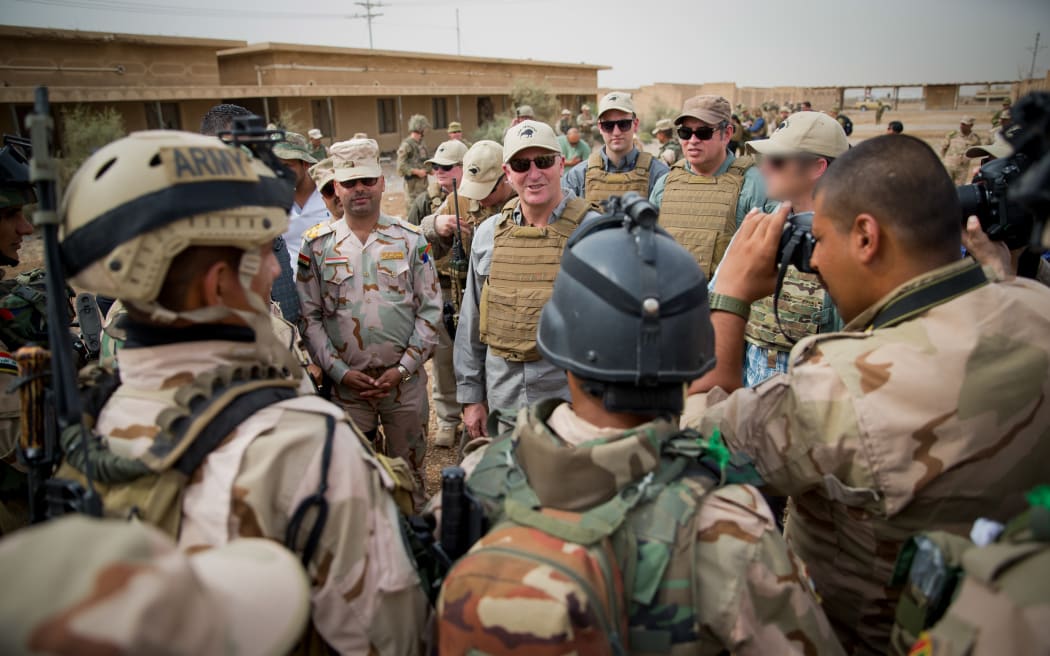
Photo: Pool Picture
One of the New Zealand trainers in Taji Camp said you could never be too careful, so building rapport was critical.
"We take it right back to a basic level so everything's done step by step, just like we'd do at home, especially when they're introduced to a new weapons system, they learn all the dry drills first.
"We'll keep training them until we're happy with the standard, so they won't do anything live until we're all happy. But because we're essentially trainers at home - we're senior NCOs (Non-Commissioned Officers) - it's something that we do back at home, it's just the same.
"We look at the atmospherics, but we haven't had any problems, we're quite comfortable, we won't do anything until we're comfortable they're ready to move to the next level."
Another trainer said many of the trainees had already seen combat against Islamic State.
"One thing that gets us is when they come in for training and we ask them what they've already done. Some of the stories are pretty outrageous. So they'll show us their bullet wounds from where they've been shot. Like one guy who'd been shot and his mate carried him a kilometre to get him to safety and swum across a river, things like that.
"We asked them to put their hands up who's been involved in an IED and the whole class puts their hands up."
An Iraqi captain, of one of the battalions being trained by the New Zealanders, said the training was very good.
"My soldiers understand that when your training is good it helps your job, because you're working together, training together, and go as one team, one fight."
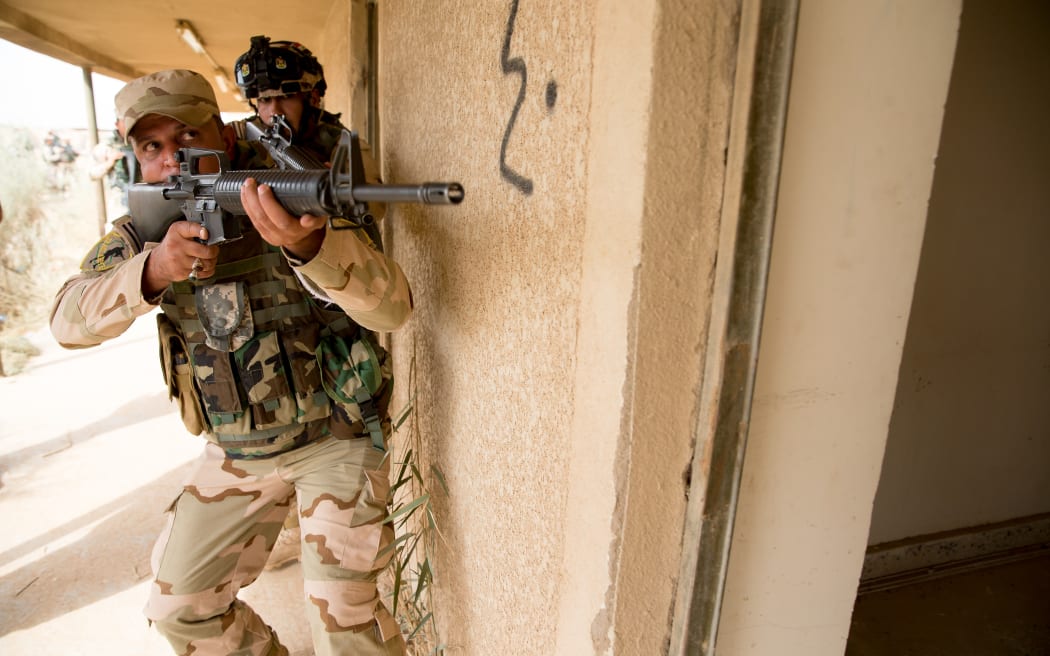
Photo: POOL
'Operation Inherent Resolve'
US coalition spokesman Colonel Steve Warren offered reporters a briefing in Baghdad about the 62-nation coalition 'Operation Inherent Resolve', which has the primary purpose of defeating Islamic State. Seventeen of those countries are operating in some form in Iraq, including New Zealand.
He said having New Zealand involved in the coalition efforts against IS demonstrated it was a worldwide fight.
"And I think sometimes we lose sight of that.
"This is possibly the most brutal, vicious group of people we've seen certainly in recent memory - they chop people's heads off on TV, they immolate, they crucify, they run systematic sex slavery rings, they use violence, torture and rape, as everyday tools.
"And keeping this coalition stitched together, against this evil, cannot be overstated."
Colonel Warren was asked what he would say to those who were somewhat cynical about US foreign policy, and why that country was leading the fight against IS in Iraq and Syria, when there were brutal regimes in other countries, also carrying out atrocities.
"Well, I'm just a soldier so I don't talk about policy much...."
PM meets Iraqi President
While Mr Key was in Baghdad on Sunday, he was flown into the green zone, and in some parts across the red zone, on an American Iroquois under heavy guard. There, he met with Iraqi President Fuad Masum at the Presidential Palace and Prime Minister Haider al-Abadi at the Prime Minister's Palace.
In a short address, Mr Key thanked Mr al-Abadi for the invitation to Iraq, and the political leadership he had shown.
"There are tremendous challenges but you have shown great vision for your country and you are doing everything you possible can.
"New Zealand is here to support through the training camp that we have up in Taji, alongside our friends the Australians - I hope we are making a difference to the capabilities of your defence forces."
"Of course this has been a big topic of conversation, we were both there at the United Nations last week where we recognised the challenges and the issues you come up against; a terrorist organisation like Daesh, but we know you have a very clear plan... and New Zealand wants to play its part in assisting the people of Iraq to ensure they can keep their cities and regain control of the ones they're lost."

